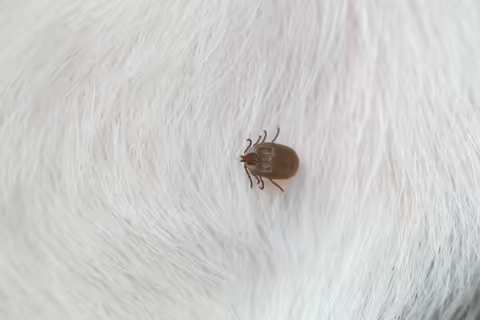What is a dangerous animal encounter?
A dangerous encounter is one that poses immediate danger to your health or wellbeing. You should be vigilant to avoid these encounters. If you are already experiencing the encounter, give it your full attention. These include ticks, bacteria, etc.
Explore Everyday Encounters Explore Annoying Encounters Explore Risky Encounters
I have been bitten by a venomous snake...
Illinois is home to four venomous snake species: the eastern copperhead, northern cottonmouth, timber rattlesnake, and the massasauga. Find the distribution range for each species in this herpetology guide from the Illinois Natural History Survey. If you are bitten by a venomous snake, you will likely experience sharp and immediate pain at the site of the bite, followed by rapid swelling or bruising. Keep calm and seek emergency medical attention immediately. A few of these snakes can deliver a lethal dose of venom. Do not attempt to kill or collect the snake, as you risk further aggravating it.
I have been stung by insects multiple times...
Multiple stings – 10 or more – can pose unique dangers to human health, especially in children, the elderly, and people who have heart or breathing issues. These can cause severe anaphylactic reactions, which constitute an eminent medical emergency. In addition, the cumulative impact of multiple doses of venom can induce toxic reactions in the body. If you experience nausea, vomiting, diarrhea, headache, dizziness, vertigo, fainting, fever, convulsions or seizures, or symptoms of anaphylaxis, seek medical attention immediately. Multiple sting events are also associated with rare but dangerous heart problems. If in doubt, seek medical attention.
Men die from insect stings at disproportionate rates. Scientists speculate this may be because men disproportionately take jobs that put them in contact with stinging insects, like farming, forestry, and electrical line work. Men also have higher risk for certain allergic reactions. To the men of Illinois and beyond; when in doubt, please seek medical attention!
Bats are in my house…
Bats that roost in trees sometimes mistake buildings for big hollow trees. Occasionally a large bat colony will take up residence in the attic or walls of a house and they can be challenging to evict. Bats are the primary carriers of rabies in Illinois, and their accumulated feces, or guano, can have fungi that cause respiratory illness. You don’t want a colony of bats living in your house. If you think anyone in your house could have been bitten by a bat, seek medical attention immediately. For people or pets unable to report a bite, act as though they were bitten. Even groups of bats will be fairly quiet except right before dusk, when they vocalize as they prepare to exit for the night. Stay alert for bat squeaks from your walls or attic. Watch your house from the outside to see if bats emerge at dusk if you suspect they are present. It is possible to remove a single bat from your house by opening windows and doors or by capturing the bat in a shoebox. However, you should never handle bats directly and should allow animal control to remove any bat suspected of biting someone. If a bat colony is occupying your home, seek professional help to remove them.
I have a tick on me...
Ticks are dangerous primarily because of the disease-causing pathogens they can carry. While Lyme disease is the most well-known tick-caused illness, many other diseases can occur after infection by pathogens — bacteria, viruses, or other parasites — transmitted by various tick species. Some types of ticks are expanding their range in Illinois. The Illinois Department of Public Health operates a Tick Surveillance Map that shows tick species in your area and the diseases they may carry. The best way to guard against tick-borne diseases is to prevent ticks from biting you by employing strategies recommended by the CDC to repel or block ticks from your skin. If a tick has already embedded itself in your skin, then it is important to remove it safely, identify the tick to species, and retain the tick in the event it is needed for testing. For instructions on how to safely remove and store ticks, monitor bites sites, and more, visit the INHS Tick Bite Response website. Further information on tick removal, ranges, diseases, and testing is provided by INHS Medical Entomology Resources.
At Extension, we help people find solutions to life's challenges. Connect with Extension staff in your area for research-based information and solutions. Extension staff on the natural resources, environment, and energy team focus on issues related to wildlife and human and wildlife interactions.
